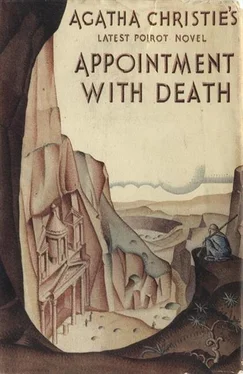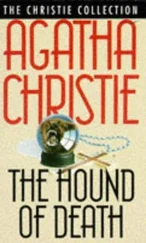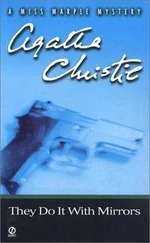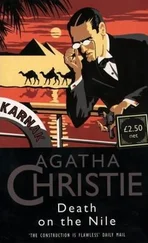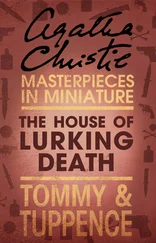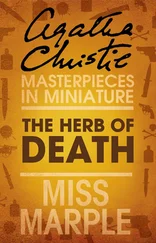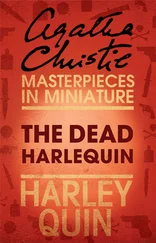Agatha Christie - Appointment with Death
Здесь есть возможность читать онлайн «Agatha Christie - Appointment with Death» весь текст электронной книги совершенно бесплатно (целиком полную версию без сокращений). В некоторых случаях можно слушать аудио, скачать через торрент в формате fb2 и присутствует краткое содержание. Год выпуска: 2007, ISBN: 2007, Издательство: Black Dog & Leventhal Publishers, Жанр: Классический детектив, на английском языке. Описание произведения, (предисловие) а так же отзывы посетителей доступны на портале библиотеки ЛибКат.
- Название:Appointment with Death
- Автор:
- Издательство:Black Dog & Leventhal Publishers
- Жанр:
- Год:2007
- ISBN:ISBN-10: 1579126928
- Рейтинг книги:4 / 5. Голосов: 1
-
Избранное:Добавить в избранное
- Отзывы:
-
Ваша оценка:
- 80
- 1
- 2
- 3
- 4
- 5
Appointment with Death: краткое содержание, описание и аннотация
Предлагаем к чтению аннотацию, описание, краткое содержание или предисловие (зависит от того, что написал сам автор книги «Appointment with Death»). Если вы не нашли необходимую информацию о книге — напишите в комментариях, мы постараемся отыскать её.
Appointment with Death — читать онлайн бесплатно полную книгу (весь текст) целиком
Ниже представлен текст книги, разбитый по страницам. Система сохранения места последней прочитанной страницы, позволяет с удобством читать онлайн бесплатно книгу «Appointment with Death», без необходимости каждый раз заново искать на чём Вы остановились. Поставьте закладку, и сможете в любой момент перейти на страницу, на которой закончили чтение.
Интервал:
Закладка:
Poirot said quickly: "That is the one point on which I am not yet completely informed. What was the method you counted on employing? You had a method-and it was connected with a hypodermic syringe. That much I know. If you want me to believe you, you must tell me the rest."
Raymond said hurriedly: "It was a way I read in a book-an English detective story. You stuck an empty hypodermic syringe into someone and it did the trick. It sounded perfectly scientific. I-I thought we'd do it that way."
"Ah," said Poirot. "I comprehend. And you purchased a syringe?"
"No. As a matter of fact, we pinched Nadine's."
Poirot shot a quick look at her. "The syringe that is in your baggage in Jerusalem?" he murmured.
A faint color showed in the young woman's face. "I-I wasn't sure what had become of it," she said,
Poirot murmured: "You are so quick-witted, Madame."
16
There was a pause. Then, clearing his throat with a slightly affected sound, Poirot went on: "We have now solved the mystery of what I might term the second hypodermic. That belonged to Mrs. Lennox Boynton, was taken by Raymond Boynton before leaving Jerusalem, was taken from Raymond by Carol after the discovery' of Mrs. Boynton's dead body, was thrown away by her, found by Miss Pierce, and claimed by Miss King as hers. I presume Miss King has it now."
"I have," said Sarah.
"So that when you said it was yours just now, you were doing what you told us you do not do-you told a lie."
Sarah said calmly: "That's a different kind of lie. It isn't-it isn't a professional lie."
Gerard nodded appreciation. "Yes, it is a point that. I understand you perfectly Mademoiselle."
"Thanks," said Sarah.
Again Poirot cleared his throat: "Let us now review our time table: Thus:
Boyntons and Jefferson Cope leave the camp 3:05 (approx.)
Dr. Gerard and Sarah King leave the camp 3:15 (approx.)
Lady Westholme and Miss Pierce leave the camp 4:15
Dr. Gerard returns to camp 4:20 (approx.)
Lennox Boynton returns to camp 4:35
Nadine Boynton returns to camp and talks to Mrs. Boynton 4:40 (approx.)
Nadine Boynton leaves her mother-in-law and goes to marquee 4:50 (approx.)
Carol Boynton returns to camp 5:10
Lady Westholme, Miss Pierce and M. Jefferson Cope return to camp 5:40
Raymond Boynton returns to camp 5:50
Sarah King returns to camp 6:00
Body discovered 6:30
"There is, you will notice, a gap of twenty minutes between four-fifty, when Nadine Boynton left her mother-in-law, and five-ten when Carol returned. Therefore, if Carol is speaking the truth, Mrs. Boynton must have been killed in that twenty minutes."
"Now who could have killed her? At that time Miss King and Raymond Boynton were together. Mr. Cope (not that he had any perceivable motive for killing her) has an alibi. He was with Lady Westholme and Miss Pierce. Lennox Boynton was with his wife in the marquee. Dr. Gerard was groaning with fever in his tent. The camp is deserted, the boys are asleep. It is a suitable moment for a crime! Was there a person who could have committed it?"
His eyes went thoughtfully to Ginevra Boynton.
"There was one person. Ginevra Boynton was in her tent all the afternoon. That is what we have been told-but actually there is evidence that she was not in her tent all the time: Ginevra Boynton made a very significant remark. She said that Dr. Gerard spoke her name in his fever. And Dr. Gerard has also told us that he dreamt in his fever of Ginevra Boynton's face. But it was not a dream! It was actually her face he saw, standing there by his bed. He thought it an effect of fever-but it was the truth. Ginevra was in Dr. Gerard's tent. Is it not possible that she had come to put back the hypodermic syringe after using it?"
Ginevra Boynton raised her head with its crown of red-gold hair. Her wide beautiful eyes stared at Poirot. They were singularly expressionless. She looked like a vague saint.
"Ah! Me non!" cried Dr. Gerard.
"Is it then so psychologically impossible?" inquired Poirot.
The Frenchman's eyes dropped.
Nadine Boynton said sharply: "It's quite impossible!"
Poirot's eyes came quickly round to her. "Impossible, Madame?"
"Yes." She paused, bit her lip, then went on: "I will not hear of such a disgraceful accusation against my young sister-in-law. We-all of us-know it to be impossible."
Ginevra moved a little on her chair. The lines of her mouth relaxed into a smile-the touching, innocent, half-unconscious smile of a very young girl.
Nadine said again: "Impossible."
Her gentle face had hardened into lines of determination. The eyes that met Poirot's were hard and unflinching.
Poirot leaned forward in what was half a bow. "Madame is very intelligent," he said.
Nadine said quietly: "What do you mean by that, M. Poirot?"
"I mean, Madame, that all along I have realized you have what I believe is called an 'excellent headpiece.'"
"You flatter me."
"I think not. All along you have envisaged the situation calmly and collectedly. You have remained on outwardly good terms with your husband's mother, deeming that the best thing to be done, but inwardly you have judged and condemned her. I think that some time ago you realized that the only chance for your husband's happiness was for him to make an effort to leave home-strike out on his own, no matter how difficult and penurious such a life might be. You were willing to take all risks and you endeavored to influence him to exactly that course of action. But you failed, Madame. Lennox Boynton had no longer the will to freedom. He was content to sink into a condition of apathy and melancholy."
"Now, I have no doubt at all, Madame, but that you love your husband. Your decision to leave him was not actuated by a greater love for another man. It was, I think, a desperate venture undertaken as a last hope. A woman in your position could only try three things. She could try appeal. That, as I have said, failed. She could threaten to leave her husband. But it is possible that even that threat would not have moved Lennox Boynton. It would plunge him deeper in misery but it would not cause him to rebel. There was one last desperate throw. You could go away with another man. Jealousy and the instinct of possession are two of the most deeply rooted fundamental instincts in man. You showed your wisdom in trying to reach that deep, underground, savage instinct. If Lennox Boynton would let you go to another man without an effort-then he must indeed be beyond human aid, and you might as well then try to make a new life for yourself elsewhere."
"But let us suppose that even that last desperate remedy failed. Your husband was terribly upset at your decision, but in spite of that he did not, as you had hoped, react as a primitive man might have done, with an uprush of the possessive instinct. Was there anything at all that could save your husband from his own rapidly failing mental condition? Only one thing. If his stepmother were to die, it might not be too late. He might be able to start life anew as a free man, building up in himself independence and manliness once more."
Poirot paused, then repeated gently: "If your mother-in-law were to die…"
Nadine's eyes were still fixed on his. In an unmoved gentle voice she said: "You are suggesting that I helped to bring that event about, are you not? But you cannot do so, M. Poirot. After I had broken the news of my impending departure to Mrs. Boynton, I went straight to the marquee and joined Lennox. I did not leave there again until my mother-in-law was found dead. Guilty of her death I may be, in the sense that I gave her a shock-that of course presupposes a natural death. But if, as you say-(though so far you have no direct evidence of it and cannot have until an autopsy has taken place)-she was deliberately killed, then I had no opportunity of doing so."
Читать дальшеИнтервал:
Закладка:
Похожие книги на «Appointment with Death»
Представляем Вашему вниманию похожие книги на «Appointment with Death» списком для выбора. Мы отобрали схожую по названию и смыслу литературу в надежде предоставить читателям больше вариантов отыскать новые, интересные, ещё непрочитанные произведения.
Обсуждение, отзывы о книге «Appointment with Death» и просто собственные мнения читателей. Оставьте ваши комментарии, напишите, что Вы думаете о произведении, его смысле или главных героях. Укажите что конкретно понравилось, а что нет, и почему Вы так считаете.
